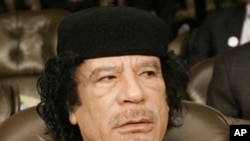Despite his ouster by insurgents, Libyan leader Moammar Gadhafi continues to maintain some popularity in Africa's Sahel region following years of Libyan investment and the perception that Tripoli's new leaders are more interested in Europe.
Hunted at home, Colonel Gadhafi is far more welcome south of Libya in Sahelian countries were he has invested millions of dollars in public and private projects. A convoy of Gadhafi supporters was reported to cross into Niger Monday, and Burkina Faso offered asylum to the ousted Libyan leader, though a government spokesman withdrew the offer on Tuesday.
Shehu Sani, the president of the Civil Rights Congress of Nigeria and the author of the book Civilian Dictators of Africa, says Colonel Gadhafi is still well regarded by a generation of Africans who have benefited from his patronage.
“Gadhafi has invested a lot of Libyan money in improving the human conditions of people in countries like Niger and Burkina Faso," said Sani. "In northern parts of Nigeria, there are thousands of young people who have been offered scholarships over the years by the Gadhafi regime to study in Libya and in some countries in the Middle East and around the world.”
Colonel Gadhafi was long the single largest financier of the African Union as well as the Organization of African Unity before it. He used Libya's oil wealth to support neighboring countries in debt and, Sani says, now looks set to collect on much of that goodwill.
“The attachment and the offer being given by governments in West Africa, especially that of Burkina Faso, has to do with the fact that it was Gadhafi who sustained those governments for a very long time," said Sani. "And now it is the time for me to also show appreciation by coming to your own aid at your moment of need.”
Thousands of migrant workers from Nigeria, Niger, Mali, Burkina Faso, and Ghana found work in Libya when they were unable to reach Europe. For many in the Sahel, Sani says those remittances have obscured Colonel Gadhafi's abuses at home.
“Now there is that emotional, psychological, and economic attachment to the Gadhafi regime over the years," said Sani. "Because of that his evil, in quotes, in his country is being ignored.”
The Gadhafi regime was particularly close to Tuareg nomads from Niger and Mali, many of whom joined his military and are now thought to be part of the advance team preparing his exile.
Revenge attacks against Africans have raised concerns about Libya's new leaders. Sani says the National Transitional Council appears to be far more involved with its European and NATO backers than it does with the African Union and Sahelian countries with whom the Gadhafi regime established close relations.
“It is unpopular because the images of black Africans being shown to be arrested and tortured by members of the ruling rebel government there is sending a lot bad signals," he said. "What the rebel government needs to do now is extend the hands of friendship to those countries in the Sahel and those countries that were also benefiting from Gadhafi. Without that, the stability and peace of Libya will never be guaranteed.”
Given the Gadhafi regime's long-standing ties with rebel groups across the Sahel, Sani says Tripoli's new leaders must move quickly to prevent Gadhafi aides from using that network against them.










